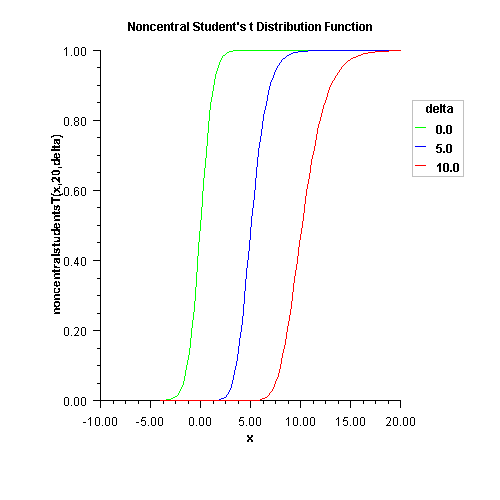| CdfNoncentralstudentsT Method |
Namespace: Imsl.Stat
Assembly: ImslCS (in ImslCS.dll) Version: 6.5.2.0
Parameters
- t
- Type: SystemDouble
A double scalar value representing the argument at which the function is to be evaluated. - idf
- Type: SystemInt32
An int scalar value representing the number of degrees of freedom. This must be positive. - delta
- Type: SystemDouble
A double scalar value representing the noncentrality parameter.
Return Value
Type: DoubleA double scalar value representing the probability that a noncentral Student's t random variable takes a value less than or equal to t.
The noncentral t random variable can be defined by the
distribution function above, or alternatively and equivalently, as
the ratio of a normal random variable and an independent
chi-squared random variable. If w has a normal distribution
with mean ![]() and variance equal to one,
and variance equal to one,
![]() has an independent chi-squared distribution
with
has an independent chi-squared distribution
with ![]() degrees of freedom, and
degrees of freedom, and
The distribution function of the noncentral ![]() can also be expressed as a double integral involving a
normal density function (see, for example, Owen 1962, page 108).
The method Cdf.NoncentralstudentsT uses the method of Owen
(1962, 1965), which uses repeated integration by parts on that
alternate expression for the distribution function.
can also be expressed as a double integral involving a
normal density function (see, for example, Owen 1962, page 108).
The method Cdf.NoncentralstudentsT uses the method of Owen
(1962, 1965), which uses repeated integration by parts on that
alternate expression for the distribution function.
